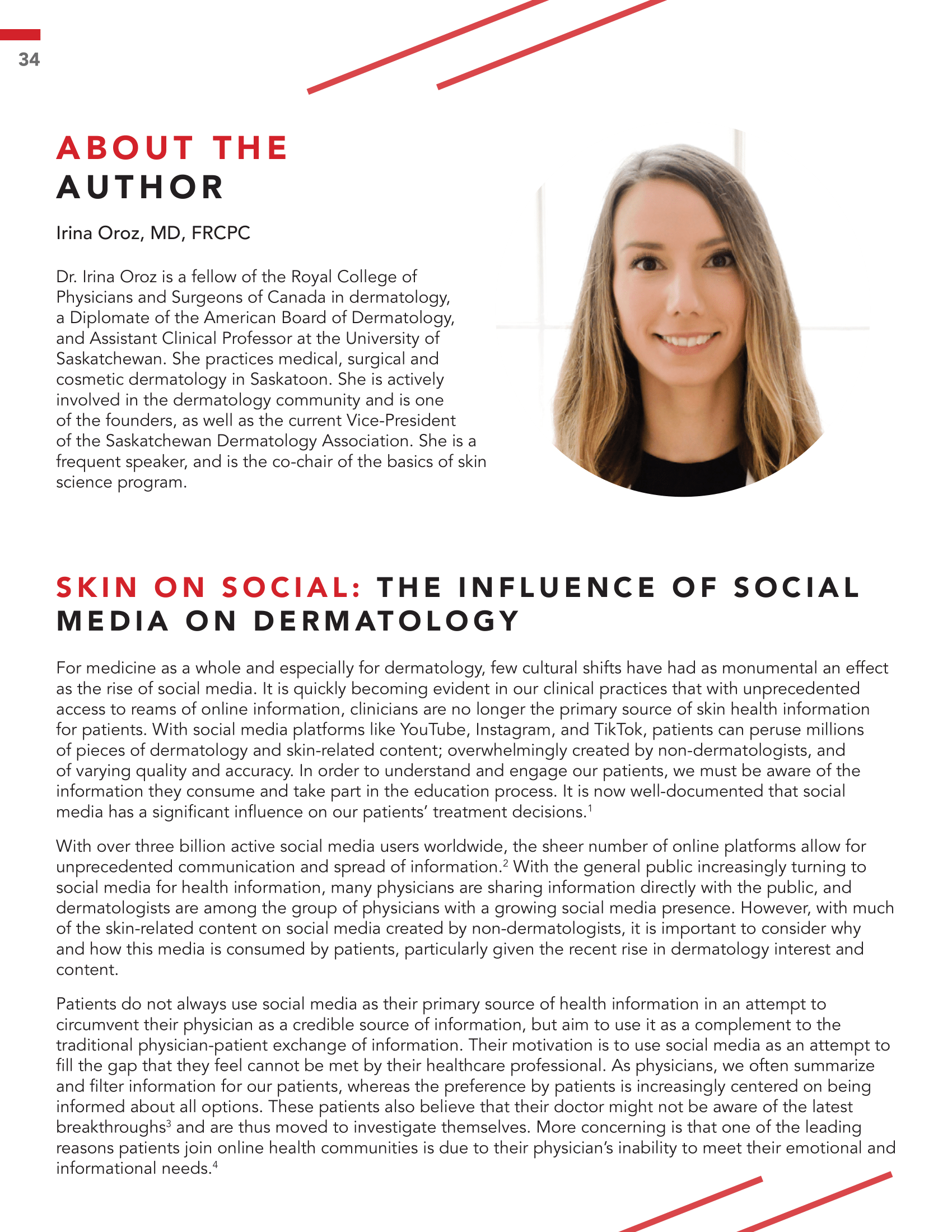Skin On Social: The Influence Of Social Media On Dermatology
Abstract
For medicine as a whole and especially for dermatology, few cultural shifts have had as monumental an effect as the rise of social media. It is quickly becoming evident in our clinical practices that with unprecedented access to reams of online information, clinicians are no longer the primary source of skin health information for patients. With social media platforms like YouTube, Instagram, and TikTok, patients can peruse millions of pieces of dermatology and skin-related content; overwhelmingly created by non-dermatologists, and of varying quality and accuracy. In order to understand and engage our patients, we must be aware of the information they consume and take part in the education process. It is now well-documented that social media has a significant influence on our patients’ treatment decisions.
With over three billion active social media users worldwide, the sheer number of online platforms allow for unprecedented communication and spread of information. With the general public increasingly turning to social media for health information, many physicians are sharing information directly with the public, and dermatologists are among the group of physicians with a growing social media presence. However, with much of the skin-related content on social media created by non-dermatologists, it is important to consider why and how this media is consumed by patients, particularly given the recent rise in dermatology interest and content.
References
Smailhodzic E, Hooijsma W, Boonstra A, Langley DJ. Social media use in healthcare: a systematic review of effects on patients and on their relationship with healthcare professionals. BMC Health Serv Res. 2016 Aug 26;16(1):442.
Chaffey D. Global social media research summary 2018 Internet: Smart Insights; 2018 [updated March 28, 2018; cited 2018 August 7]. Available from: https://www.smartinsights.com/ social-media-marketing/social-media-strategy/ new-global-social-media-research/
Colineau N, Paris C. Talking about your health to strangers: understanding the use of online social networks by patients. New Rev Hypermed Multimed. 2010;16(1):141–60.
Rupert DJ, Moultrie RR, Read JG, Amoozegar JB, Bornkessel AS, Donoghue AC, Sullivan HW. Perceived healthcare provider reactions to patient and caregiver use of online health communities. Patient Educ Couns. 2014;96(3):320–6.
Schaefer C, Coyne JC, Lazarus RS. The health-related functions of social support. J Behav Med. 1981;4(4):381–406.
Broom A. The eMale: Prostate cancer, masculinity, and online support as a challenge to medical expertise. J Sociol. 2005;41(1):87–104.
Stapleton JL, Hillhouse J, Coups EJ, et al. Social media use and indoor tanning among a national sample of young adult nonHispanic white women: A cross-sectional study. J Am Acad Dermatol. 2016;75:218–220.
Park JH, Christman MP, Linos E, et al. Dermatology on Instagram: an analysis of hashtags. J Drugs Dermatol. 2018;17:482–484.
Braunberger T, Mounessa J, Rudningen K, et al. Global skin diseases on Instagram hashtags. Dermatol Online J. 2017;23(5):8.
https://www.omnicoreagency.com/instagram-statistics/
Sierro TJ, Young PM, Kassabian SK, Wu KK, Armstrong AW. Dermatologists in social media: A study on top influencers, posts, and user engagement. J Am Acad Dermatol. 2020 Nov;83(5):1452-1455.
Nosrati A, Pimentel MA, Falzone A, et al. Skin cancer prevention messages on Facebook: likes, shares, and comments. J Am Acad Dermatol. 2018;79(3):582-585.e1.
Ranpariya V, Chu B, Fathy R, Lipoff JB. Dermatology without dermatologists? Analyzing Instagram influencers with dermatology-related hashtags. J Am Acad Dermatol. 2020 Dec;83(6):1840-1842.
Anderson M, Jiang J. Teens, social media & technology 2018. Available at: https://www. pewinternet.org/2018/05/31/teens- social-media-technology-2018/. Accessed July 5, 2021.
Andrea J Borba, Paulina M Young, Charlotte Read, April W Armstrong. Engaging but inaccurate: A cross-sectional analysis of acne videos on social media from non–health care sources, Journal of the American Academy of Dermatology. 2020 Aug;83(2):610-612.
Yousaf A, Hagen R, Delaney E, Davis S, Zinn Z. The influence of social media on acne treatment: A cross-sectional survey. Pediatr Dermatol. 2020 Mar;37(2):301-304.
Villa-Ruiz C, Kassamali B, Mazori DR, Min M, Cobos G, LaChance A. Overview of TikTok’s most viewed dermatologic content and assessment of its reliability. J Am Acad Dermatol. 2020.
Zheng DX, Ning AY, Levoska MA, Xiang L, Wong C, Scott JF. Acne and social media: A cross-sectional study of content quality on TikTok. Pediatr Dermatol. 2021 Jan;38(1):336- 338.


